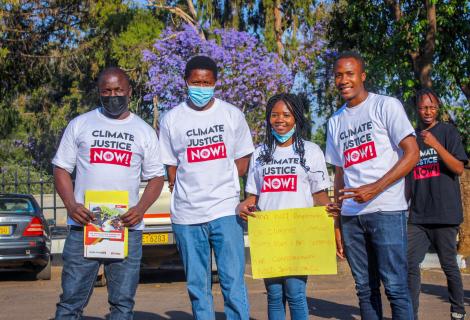Calls to Government to speed up finalising the Disaster Risk Management and Civil Protection Bill

Press Statement
Harare-19 August 2022. ActionAid Zimbabwe (AAZ) joins the rest of the world in commemorating World Humanitarian Day, themed #TheHumanRace marking the global challenge for climate action in solidarity with people who need it most. On this day, AAZ calls upon the Government of Zimbabwe (GoZ) to finalise the Disaster Risk Management and Civil Protection Bill (DRMCP) to promote disaster management structures that have fully devolved powers, competences, responsibilities, and resources to sub-national levels. With an inclusive new and robust disaster risk reduction policy framework, Zimbabwe could greatly reduce the number of people who require humanitarian assistance every year.
Celebrated on 19 August each year, World Humanitarian Day is an international day dedicated to humanitarian workers and those who have lost their lives working for humanitarian causes. It was designated by the United Nations General Assembly as part of Swedish-sponsored General Assembly Resolution A/63/L.49 on strengthening of the Coordination of Emergency Assistance of the UN.
Like the world over, Zimbabwe has been grappling with the impact of climate change and its related humanitarian consequences. Climatic shocks, economic challenges and the COVID-19 pandemic have been driving humanitarian needs in Zimbabwe. Statistics show that the number of people in need of humanitarian assistance has been steadily ballooning in the past five years, from 2.8 million people in 2016 (Zimbabwe Vulnerability Assessment Committee Report 2016) to 7.9 million in 2021 (Zimbabwe Humanitarian Response Plan 2021). Of these people in need of humanitarian assistance, about 75% of them are women, girls, and children because these sections of the population always bear the brunt of most disasters. Women and girls face numerous challenges during humanitarian situations such as increased sexual and gender-based violence cases, psychosocial trauma, early and forced marriages, trafficking, forced migration, increased poverty, and changes in self-perception, among other effects. Yet women are conspicuously invisible in most countries’ disaster risk reduction legislations, policies, structures, and systems.
Thus, as we commemorate this Humanitarian Day, we are reminded of the deficiencies associated with the disaster risk reduction policy framework in Zimbabwe. Despite the increasing humanitarian situation in the country, Zimbabwe has been very slow to revise and enact a robust disaster risk reduction policy framework but still clings to the old Civil Protection Act of 1989. Furthermore, the country does not have a comprehensive National Policy on Disaster Risk Management, a situation of great concern in the face of rising climate change-related disasters. Although the Cabinet approved the principles of the DRMCP on 7 June 2022, the nation is likely to see a stagnation of the process going forward due to the GoZ’s lack of political will to finalise the DRMCP into law. This bill has been in the pipeline for more than a decade, despite the growing threat from the surging disasters in the past years.
AAZ, therefore, urges GoZ, as it works on the Disaster Risk Management and Civil Protection Bill, to ensure that:
1. The new law incorporates women, youth, and people with disabilities in the disaster risk management structures and decision-making process in terms of Sections 17, 20 and 22 of the Constitution of Zimbabwe.
2. The new law promotes a culture of disaster preparedness and investment in Disaster Risk Reduction (DRR) measures and places emphasis on disaster prevention and mitigation rather than on humanitarian response.
3. The new law promotes disaster management structures that have full devolution powers, competences, responsibilities, and resources to sub-national levels.
4. It prioritises the finalisation of the Disaster Risk Management and Civil Protection Bill into law.
For more details please contact:
ActionAid Zimbabwe Country Director, Joy Mabenge: Email joy.mabenge@actionaid.org or Mobile +263 772904479
Twitter: https://twitter.com/ActionAidZim
Facebook: https://www.facebook.com/ActionAidZimbabwe/
Website: https://zimbabwe.actionaid.org/
ENDS//